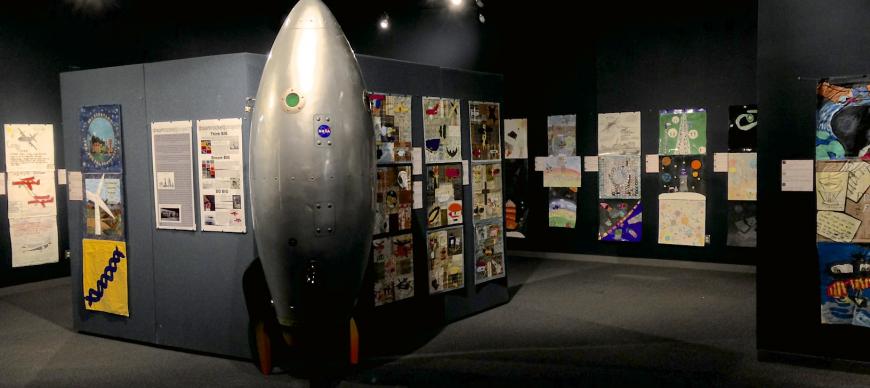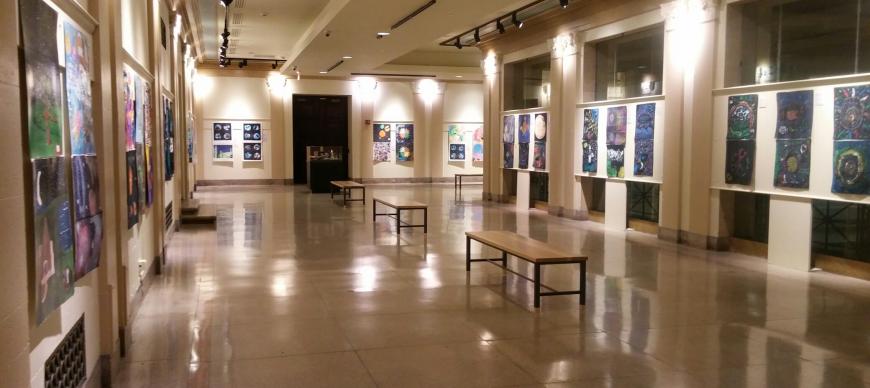May 1, 2016 – November 1, 2016
When an archaeological site has been damaged, a page from the storybook about mankind (aka “history”) has been ripped out before it could ever be written. Today, heritage is under threat as never before. K-12 students and adults respond to the memory of the history that has been lost through looting and destruction and hope for the history yet to be discovered by archaeologists through 2-dimensional art. Presented in collaboration with The Dream Rocket Project.
----------
Students Respond to the Destruction of Archaeological Sites
By Moriah Grooms-García
Today, heritage is under threat as never before. Political instability, conflict, as well as the lesser-known cause of urban growth have made the destruction and looting of archaeological sites widespread around the world. While the American contribution to the problem is not limited to its role as a significant consumer of the looted artifacts that make their way to the marketplace, it is a contribution that can be fought through public education.
With this goal in mind, the Oriental Institute Department of Public Education and Outreach is teaming up with the International Fiber Collaborative (IFC) to raise awareness about the effects that the looting and destruction of cultural heritage has on what an archaeologist can learn about ancient people — we are using primarily the voices of K–12 students to do so.
The special exhibit Don’t Take My Stuff. Tell My Story, on display from May 1 to November 1, 2016, will be made up of 48 artwork submissions created primarily by Chicago-area students. Teachers are working with their students on 2-dimensional art created in memory of the history that has been lost due to the destruction of archaeological sites and hope for the history yet to be discovered by archaeologists. Participation is not limited to Illinois, as national interest has led us to open 10 of the 48 slots to students and adults beyond the Windy City.
Here is an excerpt from the prompt given to students for their artistic inspiration: “Even when an artifact that has been looted from an archaeological site is recovered by proper parties, the most important piece of information about that artifact has been lost: its context. An artifact that loses its context loses its story — we no longer know where it was last laid down thousands of years ago or what other artifacts it sat next to for centuries. When an archaeological site has been damaged, a page from the storybook about mankind (aka “history”) has been ripped out before it could ever be written.”
What is more, teachers are excited about the cross-curricular opportunity this exhibit presents. A teacher from Hayt Elementary in Chicago sent an excited note to the IFC coordinator for this project, Jennifer Marsh: "This will give us an opportunity to ingrate our school’s fine arts and social studies curriculum in a way that we have never explored!"
The Don’t Take My Stuff. Tell My Story. exhibit is part of the IFC’s Dream Rocket Project (DRP), an endeavor that boasts a sky-high proposal: the submissions for this and other participating exhibits will be part of a 2,000 square foot wrap that will adorn the surface of NASA’s newest Space Launch System — the mission to Mars. To date, DRP has collected 3,609 artworks with another 665 pieces currently being created for upcoming exhibits.
The deadline for artwork submissions for the Don’t Take My Stuff. Tell My Story. exhibit is April 1st. If you are interested in learning more about how you or your students can participate in submitting artwork, contact Jennifer Marsh, the director of DRP and founder of the International Fiber Collaborative, at (614) 561-9057 or jennifer@thedreamrocket.com. More information about the Dream Rocket Project is available online at www.thedreamrocket.com.
Teachers and the public interested in bringing their classes or groups to the Oriental Institute can do so by visiting the Oriental Institute’s website at oi.uchicago.edu/tours. The Don’t Take My Stuff. Tell My Story. Student Opening and Teacher Appreciation Night will be held at the Oriental Institute on May 18th, 2016, with further details to be announced at a later date.
Read the Press Release.



